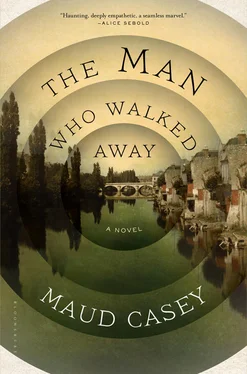But when he finds himself in a shambles of a public square — not even a monument to such-and-such general — he has not been carried away, not at all. He is still himself, though he seems to be disappearing with greater frequency. How could he ever be sure, but it seems as if he is himself less and less. It is a town so poor the people wear vests with old coins for buttons and hats of worn black felt. Some people have no shoes at all. A large greatcoat covers their misery.
“Would you like something to eat?” a child with a dirt-streaked face asks Albert, holding out a fat-fried potato in his pudgy hand. Nearby, his mother hangs clothes on a line. “He’ll come back,” she says through the clothespin between her teeth. She is speaking to her friend whose husband has gone on another bender.
“Or maybe he won’t,” the other woman says, “I should be so lucky.” The way she laughs, Albert knows she doesn’t mean it. There may be misery here, but every morning these women wake up into a family of the sort he will never have. To have a family requires being in one place. You cannot be the sort of man who ends up in Verdun with the echo of sheep bells in your head when you were meant to meet a woman who said she wanted to marry you at four o’clock somewhere else entirely.
“Would you like a potato?” the boy says, his hand still outstretched.
The boy’s kindness is more than Albert can bear. Better that the woman hanging clothes should run him off or have him thrown in jail. Better to tell him he is not fulfilling his duties as a citizen, to accuse him of causing the nation’s downfall.
What about love? It is somewhere else. Not for him. Never for him.
He wiggles his toe through the rustling leaves in his shoes. He hopes the child will understand.
Understand what? What day? What gift?
What was the question?
There is no explaining, so he does the only thing he knows how to do. Though his legs ache, though all he wants is to stop, he walks away.
“Wait!” the child calls after him. “Come back! I can make it smaller. I will cut it in half.” The boy hurls the fat-fried potato after him in frustration. He was being kind the way his mother always told him to be. Why wouldn’t this man receive his kindness? A bird, startled out of a holm oak, swoops down to where the potato lies in the dirt, spears it with its beak, and flies away.
“Come back!” cries the boy, a tug in his stomach. He is filled with a powerful longing he doesn’t understand. He wants the man who is walking away to turn around more fiercely than he has wanted anything in his short life, but the man only becomes smaller and smaller and smaller.
“Stop your shouting,” his mother shouts, and though the boy will eventually stop his shouting, though he will return to playing games — stealing his father’s worn felt hat and dropping it down the well, for example — for days he will think about the man disappearing over the horizon. The boy’s heart will be heavy with that image, and though it will fade eventually, it will return to him when he is a man and feeling melancholy. What was that ? He won’t be able to place it. It must have been a dream he had once long ago when he was a boy capable of conjuring such things.
“Don’t go!” Albert hears the boy calling out to him, but it is too late. The bird with the potato in its beak flies past his ear. He hears the boy calling him even after he has walked so far away he couldn’t possibly hear him. Don’t go! As if there were a life for Albert there.
There is no life for him there. There is no life for him anywhere.
This is no life at all.
He discovers himself fading with the light, trembling with cold amid the rubble of a cemetery wall half pulled down to make room for more victims of cholera. Though he doesn’t know it, he is not far from home. He is not thinking of home. He wants only to sink into the mud. It is better not to thrash . Let him die right there in the cemetery. No one will have to drag him from a muddy rut; no one will have to shoulder his dead body out of town. Just dig a hole.
When he sees the lamplighter, grizzled and trembling with age, Albert believes he has gotten his wish: the man must be coming to bury him here where he lies.
“Is that you, boy?” the lamplighter says, pulling him up from the cold flattened gravestone where he has been lying. “I thought I saw a shape from the path that looked like a man. I wasn’t sure if. . it’s been so long. Is that you, Albert?”
“Tell me you’re not a dream.”
“Stand up,” the old man says. Albert is tired, so tired, too tired; he leans into the warmth of the lamplighter’s body, the arm around his shoulder. “There is no need to cry. Come, now,” the lamplighter says, pulling Albert to his feet.
He is so cold and stiff he can barely walk even with the old man’s help, but he allows the lamplighter to guide him into the city, the home he is forever leaving, through the winding streets reeking of horse piss. He leans into the warmth of him as he escorts him past the public gardens with the Spanish chestnut trees under which the rats scurry, through the Cathedral Square where the men who live inside the tick-tock of regular days gather at the end of the work day, never worrying about wandering away. “Where has the time gone?” Albert imagines them saying to one another as he’s heard other men say so breezily. They don’t mean “Where is yesterday?” or “Where is the month of March?” Time has not really gone anywhere; it has not abandoned them, for example, in a cemetery to die.
“Look,” a man Albert doesn’t recognize says, though the laughing and pointing are familiar. “The man with the. . Oh! Oh! My beautiful instrument!”
“What is wrong with you?” barks the lamplighter. “Go home. Leave him be.”
Once more, kindness is so much worse than ridicule. Albert wants only to return to the cemetery. He wants to lie down and sink into the earth. Cover him with dirt; he will become the dirt. But the lamplighter won’t let him go and then they are passing the little church of St. Eulalie, where during the day men and women, so appealingly clean, whisper up and down the aisles, bowing their heads, kneeling and praying.
And then, tsk-tsk , out of the cold darkness of the church a cloaked figure appears into the shadows of dusk, clucking its tongue.
“I have seen you,” hisses a familiar voice, throwing back a cloak to reveal her sharp eyes and clucking tongue. It is the witchy-looking woman who stands guard each day to harangue anyone who will listen and those who won’t on the subjects of good and evil.
“Be quiet,” the lamplighter says, though he knows as everyone does: She sees everything.
“Behind the cathedral, abusing himself.” Her loose neck jiggles as she speaks. “God curses you.”
“God would not even bother to curse you,” the lamplighter says.
“This man!” the woman shrieks at a group of men passing by. “He has committed unspeakable acts.”
“It sounds as though you’d like him to commit them again,” one of the men says, laughing.
The witchy woman grabs a bucket and hurls the filthy water. The lamplighter shouts and tries to pull Albert clear, but his clothes are drenched, the clothes he has taken such care to keep clean in spite of the dust and the mud of the road. He has walked great distances in search of rivers, in search of ponds.
It is better not to thrash . He will not thrash. He goes limp in the lamplighter’s arms.
“You know nothing,” the lamplighter shouts at the witchy woman. “Nothing.” The filthy water has splashed him too, but it doesn’t matter. All those years ago, when everyone else turned their backs, the lamplighter remained friends with Albert and his father. He had done what he could, but it wasn’t enough. Once — it had been some time now, a year at least — he tied him to the bed, as Albert’s father surely would have done had he been there, to keep him from walking but it hadn’t worked. After that, from time to time, he would see the boy around town but recently he had not and he had come to believe Albert was gone forever. Disappeared was as much as he allowed himself to imagine, vanished over the horizon. To imagine the terrible end the boy might have met on the road, it was too much. Now the lamplighter has the chance to make it right as much as it is possible to make it right. He pulls Albert, heavy in his wet clothes, dripping with the filthy water, toward the large iron gates across the street from the small stone church.
Читать дальше












